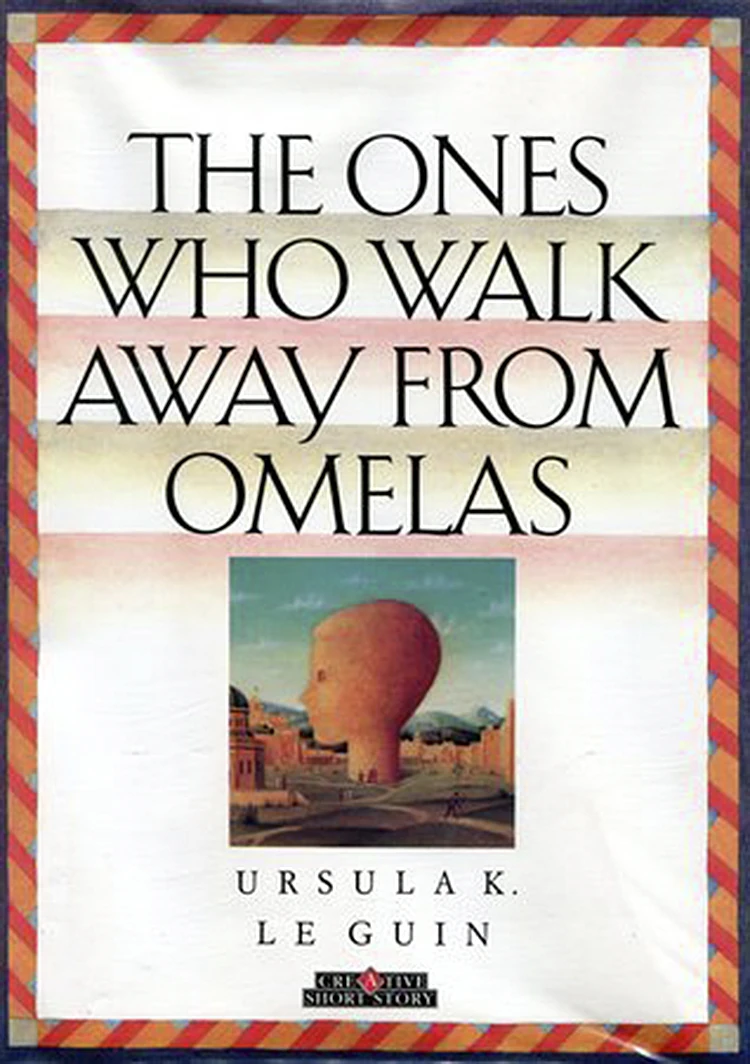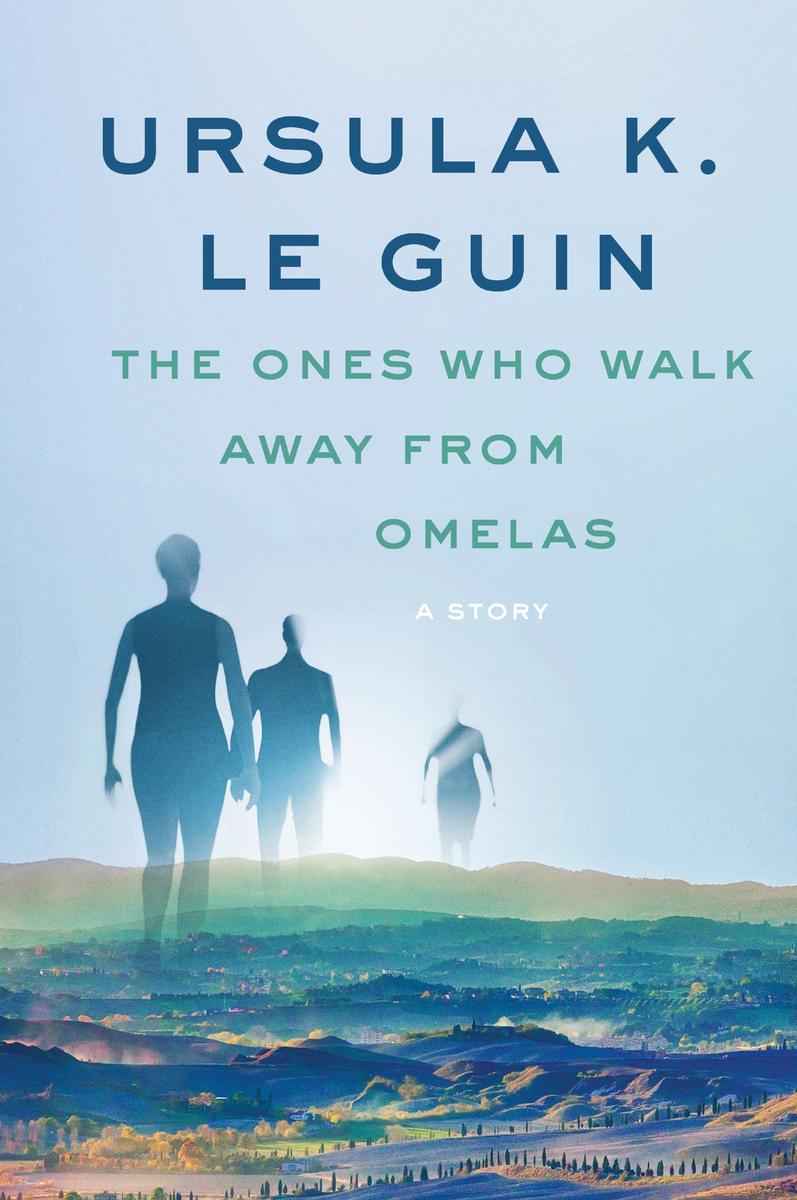
The Ones Who Walk Away From Omelas by Ursula K. Le Guin SciFi World Building YouTube
From The Wind's Twelve Quarters: Short Stories by Ursula Le Guin With a clamor of bells that set the swallows soaring, the Festival of Summer came to the city Omelas, bright-towered by the sea. The rigging of the boats in harbor sparkled with flags.

The ones who walk away from Omelas Ursula K. Le Guin Soy Nayeli
No matter what you love, you'll find it here. Search Ursula k. le guin and more. Find the deal you deserve on eBay. Discover discounts from sellers across the globe.

Ceux qui partent d'Omelas de Ursula K. LE GUIN (numérique) Le Bélial'
" The Ones Who Walk Away from Omelas " / ˈoʊməˌlɑːs / [1] is a 1973 short work of philosophical fiction by American writer Ursula K. Le Guin. With deliberately both vague and vivid descriptions, the narrator depicts a summer festival in the utopian city of Omelas, whose prosperity depends on the perpetual misery of a single child. [2] "

“Los que abandonan Omelas” (Ursula K. Le Guin, 1973) Wiki ScienceFiction Short Stories Fandom
Ursula K Le Guin (1929-2018) was an American writer who published twenty-two novels, eleven volumes of short stories, four collections of essays, twelve books for children, six volumes of poetry & four of translation, and has received many awards: Hugo, Nebula, National Book Award, PEN-Malamud, and more.

Analysis of Ursula K. Le Guin’s The Ones Who Walk Away from Omelas Literary Theory and Criticism
URSULA K. LEGUIN THE ONES WHO WALK AWAY FROM OMELAS + THE DAY BEFORE THE REVOLUTION Put together by Chicago Anarchist Black Cross, 2018. Rest In Power, Ursla K. Le Guinn (1929 - 2018) [ chiabc.tumblr.com ] [ [email protected] ] The Ones Who Walk Away From Omelas From The Wind's Twelve Quarters: Short Stories, 1973

Book Review The Ones Who Walk Away From Omelas by Ursula K. Le Guin Plus a Bonus Author
'The Ones Who Walk Away from Omelas' is a 1973 short story by the American writer Ursula K. Le Guin (1929-2018). A powerful tale which its author described as a 'psychomyth', this story uses some intriguing symbolism to put across its 'message'. Let's take a closer look at some of the key symbols of Le Guin's story.

In Memoria di Ursula K. Le Guin colei che ci ha insegnato ad allontanarci da Omelas Stay Nerd
The recipient of numerous literary prizes, including the National Book Award, the Kafka Award, and the Pushcart Prize, Ursula K. Le Guin is renowned for her spare, elegant prose, rich characterization, and diverse worlds. "The Ones Who Walk Away from Omelas" is one of her best-known stories. Winner of the 1974 Hugo Award for Best Short Story

Ursula K. Le Guin e a Antiutopia de Omelas Estado da Arte
Ursula K. Le Guin 1973 With a clamor of bells that set the swallows soaring, the Festival of Summer came to the city Omelas, bright-towered by the sea. The rigging of the boats in harbor sparkled with flags.

LOS QUE SE ALEJAN DE OMELAS URSULA K. LE GUIN AUDIOLIBRO YouTube
Ursula K. Le Guin 's short story "The Ones Who Walk Away from Omelas," which was first published in 1973, then collected in The Wind's Twelve Quarters (1975), has appeared since then in multiple anthologies. The story is an allegory about a utopian society, which invites readers to decide what the moral of the story should be.

Farewell Ursula Le Guin the One who walked away from Omelas
By Dr Oliver Tearle (Loughborough University) 'The Ones Who Walk Away from Omelas' is one of the few short stories of the last half-century or so which can truly be called a modern myth. Indeed, Ursula K. Le Guin (1929-2018), the story's author, called her 1973 tale a 'psychomyth', inspired by a passage she encountered in the work of.

The Ones Who Walk Away From Omelas Ursula K. Le Guin
Analysis It is the Festival of Summer in the city of Omelas by the sea. Everyone in the city is celebrating and dancing as they parade northward through the streets toward "the great water-meadow called the Green Fields," where naked children sit astride horses, preparing for a race. Everyone is going to watch the horse race.

Almacén de libros Quienes se marchan de Omelas
Consider Ursula K. Le Guin's story "The Ones Who Walk Away From Omelas." Since its publication in 1973, this story has become part of the literary ecosystem, especially (but certainly not.

Farewell Ursula Le Guin the One who walked away from Omelas
In the short story "The Ones Who Walk Away from Omelas" (Variations on a Theme by William James), Ursula Le Guin presents us with a utopia that turns out to include an imperfect, even nightmarish dystopia.. The tension between these two heaven-and-hell extremes could be summed up in a pull between the impulse to leave in the title and the joyous arrival of the festival that sets the stage.

The Ones Who Walk Away From Omelas by Ursula K. Le Guin An Analogy for Antinatalism
Ursula K. Le Guin Study Guide Summary Full Plot Summary The story begins with a narrator's description of the Festival of Summer in the city of Omelas, a town by the sea. The atmosphere is festive and reverent, with bells ringing out and the boats in the harbor displaying hung flags.

Episode 29 The Ones Who Walk Away from Omelas by Ursula K. Le Guin YouTube
Le Guin published "The Ones Who Walk Away from Omelas" in 1973, and it won a Hugo Award the following year. It was her third Hugo win and her first for a short story. She was inspired by an essay written by William James, " The Moral Philosopher and the Moral Life ," where he considers the origins and impulses behind human morality.

"Los que se van de Omelas" Ursula K. Le Guin Libros que desesperan Catálogo Bolivia
'The Ones Who Walk Away from Omelas' is one of Ursula K. Le Guin's best-known stories, and it has the force of a modern myth: indeed, Le Guin herself, in her note to the story, used the term 'psychomyth' to describe it. How should we respond to this troubling and powerful story?